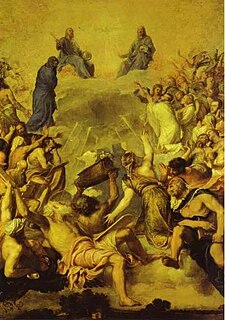This is a list of the operas of the Austrian-born (later American) composer Ernst Krenek (1900–1991).

Austria, officially the Republic of Austria, is a country in Central Europe comprising 9 federated states. Its capital, largest city and one of nine states is Vienna. Austria has an area of 83,879 km2 (32,386 sq mi), a population of nearly 9 million people and a nominal GDP of $477 billion. It is bordered by the Czech Republic and Germany to the north, Hungary and Slovakia to the east, Slovenia and Italy to the south, and Switzerland and Liechtenstein to the west. The terrain is highly mountainous, lying within the Alps; only 32% of the country is below 500 m (1,640 ft), and its highest point is 3,798 m (12,461 ft). The majority of the population speaks local Bavarian dialects as their native language, and German in its standard form is the country's official language. Other regional languages are Hungarian, Burgenland Croatian, and Slovene.
Ernst Krenek was an Austrian, later American, composer of Czech origin. He explored atonality and other modern styles and wrote a number of books, including Music Here and Now (1939), a study of Johannes Ockeghem (1953), and Horizons Circled: Reflections on my Music (1974). Krenek wrote two pieces using the pseudonym Thornton Winsloe.
| Opus | Title | Genre | Subdivisions | Libretto | Composition | Première date | Place, theatre |
|---|---|---|---|---|---|---|---|
| 14 | ZwingburgDie Zwingburg | szenische Kantate | 1 act | DemuthFritz Demuth and Franz Werfel | 1922 | 1924-10-2020 October 1924 | Berlin, Staatsoper |
| 17 | Sprung Der Sprung über den Schatten | komische Oper | 3 acts | composer | 1923 | 1924-06-099 June 1924 | Frankfurt Opera |
| 21 | Orpheus und Eurydike | Schauspiel | 3 acts | Kokoschka Oskar Kokoschka | 1923 | 1926-11-2727 November 1926 | Kassel, Staatstheater |
| 36 | Bluff | musikalische Komödie | 3 acts | LevetzowCarl von Levetzow, after George Gribble | 1924-25 | ||
| 45 | Jonny spielt auf | 2 acts | composer | 1925 | 1927-02-1010 February 1927 | Leipzig, Opera | |
| 49 | Diktator Der Diktator | tragische Oper | 1 act | composer | 1926 | 1928-05-066 May 1928 | Wiesbaden, Staatstheater |
| 50 | geheime Das geheime Königreich | Märchenoper | 1 act | composer | 1926-27 | 1928-05-066 May 1928 | Wiesbaden, Staatstheater |
| 55 | Schwergewicht, oder Die Ehre der Nation | burleske Operette | 1 act | composer | 1927-11-055 November 1927 | Cologne, Opera | |
| 60 | Leben des Orest | grosse Oper | 5 acts | composer | 1928-29 | 1930-01-1919 January 1930 | Leipzig, Neues Theater |
| 66 | Kehraus um St Stephan | Satire mit musik | 2 acts | composer | 1930 | 1990-12-066 December 1990 | Vienna, Ronacher |
| 73 | Karl V | Bühnenwerk mit Musik | 2 parts | composer | 1931-33 | 1938-06-22first version: 22 June 1938; second version: 11 May 1958 | Prague, Neues Deutsches Theater; Düsseldorf, Deutsche Oper am Rhein |
| 77 | Cefalo e Procri | fable | prologue and 3 scenes | KüfferleRinaldo Küfferle | 1934-09-1515 September 1934 | Venice, Teatro Goldoni | |
| 90 | Tarquin | drama with music | 2 parts | LaveryEmmet Lavery | 1940-41 | 1950-07-1616 July 1950 | Keulen, Städtische Bühnen |
| 111 | What Price Confidence? | komische Kammeroper | 9 scenes | composer | 1945-46 | 1962-05-2222 May 1962 | Saarbrücken, Stadttheater |
| 125 | Dark Waters | 1 act | composer | 1950 | 1951-05-022 May 1951 | Los Angeles, Bovard Auditorium | |
| 144 | Pallas Athene weint | prologue and 3 acts | composer | 1952-55 | 1955-10-1717 October 1955 | Hamburg, Staatsoper | |
| 153 | Bell The Bell Tower | 1 act | composer, after Herman Melville | 1955-56 | 1957-03-1717 March 1957 | Urbana, Illinois, Lincoln Hall Theatre | |
| 179 | Ausgerechnet und verspielt | Spieloper | 1 act | composer | 1962-07-2525 July 1962 | Vienna, ORF | |
| 186 | goldeneDer goldene Bock (Chrysomallos) | 4 acts | composer | 1962-63 | 1964-06-1616 June 1964 | Hamburg, Staatsoper | |
| 192 | ZauberspiegelDer Zauberspiegel | television opera | 14 scenes | composer | 1963-66 | 1967-09-066 September 1967 | Munich, Bayerischer Rundfunk |
| 206 | Sardakai, oder Das kommt davon | 11 scenes | composer | 1967-69 | 1970-06-2727 June 1970 | Hamburg, Staatsoper | |
| 217 | Flaschenpost vom Paradies oder Der englische Ausflug | television opera | composer | 1973 | 1974-03-088 March 1974 | Vienna, ORF |




